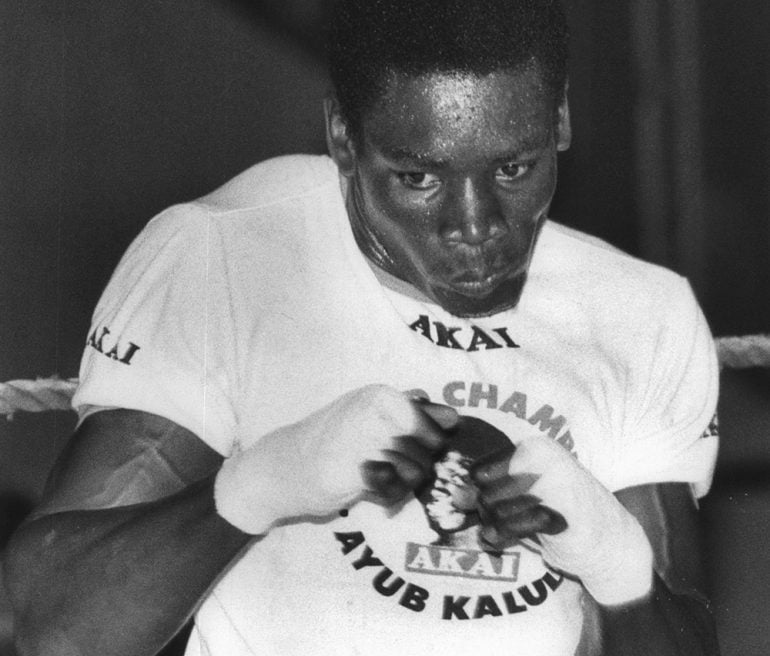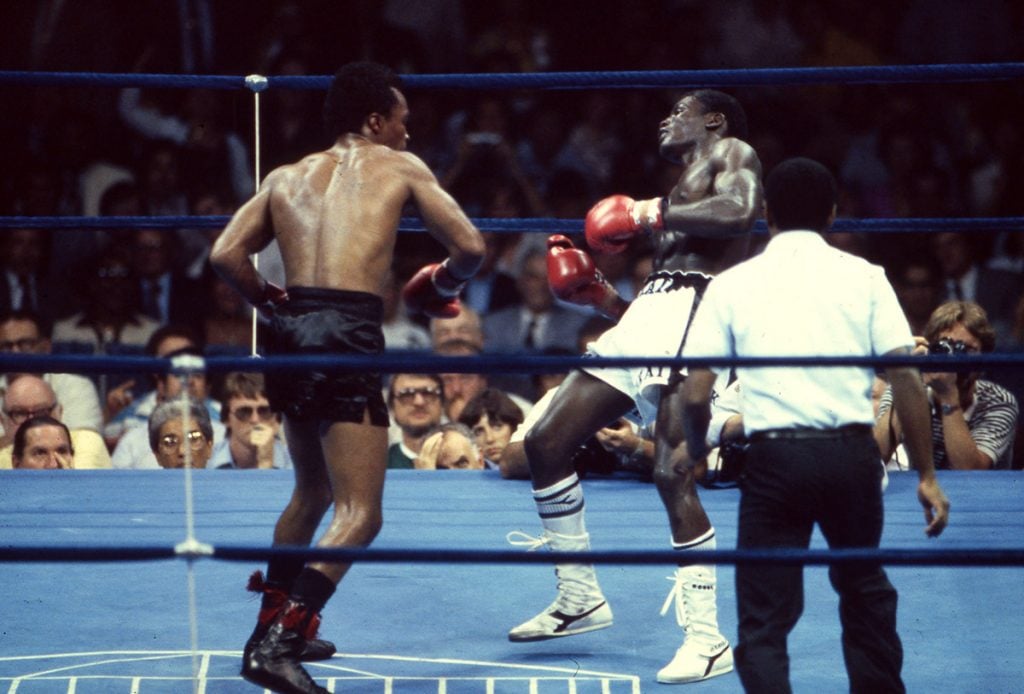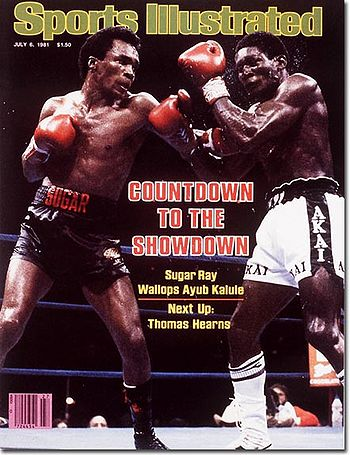Best I Faced: Ayub Kalule

Ayub Kalule was a standout amateur, who went on to enjoy considerable success as a professional and is regarded as one of the best fighters to come out of Africa.
Kalule, who was the fifth of 11 children, was born in Kampala, Uganda on January 6, 1954.
“We were not very rich but my father, who was a butcher, used to take care of us as a family,” Kalule told The Ring. “We didn’t have a lot of struggles, we had food, went to school.”
He became interested in boxing when he was 12-years-old and picked it up quickly as much out of necessity than anything else.
“My brother boxed but he stopped and I concentrated on boxing,” he explained. “During [President Milton] Obote’s regime, his tribe were very rude, that’s why I decided to box, so I could defend myself and family members from them tribesmen.”
Obote was overthrown by Idi Amin, who ruled Uganda with an iron fist throughout much of the 1970s. The head of state was known for his violent and tyrannical ways. However, he projected a very different view to Kalule from the one the outside world saw.
“Amin was a sportsman, a boxer, he used to come and visit us in training camp and provide the boxers with things,” he said. “I give Amin credit for helping my sports career. During Amin’s regime we were the fourth best country in the world [in amateur boxing.]”
During that time, Kalule went from strength to strength, claiming gold at the Commonwealth Games and inaugural World Championships in 1974.
“I was proud to win the gold medals,” he said. “I won [medals in] about eight tournaments, four gold, two silver and two bronze medals internationally during Amin’s regime.
“After winning those medals I got a warm welcome and they prepared for us a well-organized party. We were given $10,000 for winning the gold medal.”
The talented southpaw says most of his amateur resume was not on record but estimates he fought almost 50 times, losing just three times.
It was hoped Kalule could continue his impressive run and claim the top prize at the 1976 Montreal Olympics, but those Games were boycotted by his country due to the IOC failing to ban New Zealand after their national Rugby team had toured South Africa earlier that year. South Africa had been banned from taking part in the Olympics since 1964 due to its Apartheid policies.
With that dream no longer a possibility, the East African decided to turn professional and was snapped up by a European promoter.
“In Denmark, there was a nice fellow, Mogens Palle, who took care of me,” he said. “They are more organized. He was a very, very good promoter. In Uganda, they had limited resources of boxing equipment in those days, that is the difference.”
Kalule fought almost exclusively in his adopted homeland, winning his first 30 fights. He picked up the Commonwealth title and moved through the ranks notably beating seasoned professionals Sugar Ray Seales (MD 10) and Kevin Finnegan (UD 10).
“After fighting those guys, I got a chance to go and fight the Japanese fighter [Masashi Kudo.] I was No. 1 by the WBA.” said Kalule, who travelled to Japan in October 1979 to face the defending champion.
“I used to train in Japanese time zone, so that my memory got used to Japanese [time] when I was in Denmark. That was advice from my late coach, which helped me to defeat the champion in his hometown with a lot of the crowd behind him. Once I entered the ring, I attacked from first round until the last. The fight was very competitive fight.
“There was a lot of celebrations for me and my team when I returned to Denmark. Copenhagen was on fire waiting for their first professional world boxing champion. I was like Danish Prince that day. I got several calls from my family and friends in Uganda.”
The talented boxer-puncher defended his WBA title four times in Denmark.

Sugar Ray Leonard (left) drops Ayub Kalule during a defense of his WBA junior middleweight belt at the Astrodome in Houston, Texas, on June 25, 1981 – Photo by John Iacono (Sports Illustrated/Getty Images)
“All were not easy defenses,” he said. “But of all of them Marijan Benes was not a joking subject, the guy was like angry beast.”
Those wins helped earn him a fight with boxing superstar Sugar Ray Leonard, who decided to step up to junior middleweight. The fight took place at the Astrodome, Houston in June 1981.
“I came to defend my title in America, because they had put a lot of money [in front of me] so that the fight takes place in USA,” he said. “Unfortunately during the fight against Leonard, I went down on the ground in ninth round, when I got back on my feet, the referee asked me in a language which I couldn’t understand and I nodded my head meaning I can continue, but he just stopped the contest (although) I was willing to continue.”
Kalule returned with four wins in Denmark, most notably stopping former unified junior middleweight titlist Oscar Albarado (TKO 2).
That helped him earn a shot at his old title, now owned by Davey Moore in July 1982.
“After losing to Sugar Ray, that’s when I started to do sparring with Moore in New York before he took the title,” revealed Kalule, who was stopped in 10-rounds. “I was very tired going in for the fight.”
Next up, he lost against rising force, Mike McCallum (RTD 7), who later went on to become a three-weight world champion.
“He was good boxer but I was not concentrated for the fight I had some family issues,” he said.
With his career seemingly nearing the end, Kalule moved up to middleweight and after several wins, including one over future IBF super middleweight beltholder Lindell Holmes (PTS 8), he claimed the European title by beating Pierre Joly (TKO 8). He got off the canvas to edge home against future WBA middleweight kingpin Sumbu Kalambay (SD 12).
However, he then lost his crown to the very talented Herol Graham in Sheffield, England in February 1986.

“My body and heart were no longer interested in boxing,” said Kalule (46-4, 23 knockouts). “All I was thinking about was of my retirement.
“I came back to Uganda in 1986. Then I started coaching boxing, and trained some good boxers who when travelled to Europe.
“Things went bad when I separated with my wife. I got re-married after some years and we are still living together. I am now in retirement living day to day life.”
Kalule, now 69, has six children, four grandchildren and lives in the Wakiso district of Kampala, where he still helps teach the youngsters how to box.
He graciously took time to speak to The Ring about the best he fought in 10 key categories.
BEST JAB
Sugar Ray Leonard: “His jab was very, very fast, more than any other opponents, I fought.”
BEST DEFENSE
Davey Moore: “He had a very high guard and long arms which prevented most of my punches landing on him.”
BEST HANDSPEED
Leonard: “It was like a flash and he could throw several jabs at a time in any angle.”
BEST FOOTWORK
Leonard: “He was always on his toes; it was very difficult to hit him because he used to move place to place in every angle.”
SMARTEST
Leonard: “He used to plan for every punch he threw and run away very quickly after hitting.”
STRONGEST
Marijan Benes: “Benes was physically strong. He was not a very talented boxer but had a strong heart for boxing. He wanted to fight everyone, trying to knockout his opponents with power punches. He was very aggressive in our fight.”
BEST PUNCHER
Leonard: “He was the first to knock me out. Leonard’s speed made his punches more powerful than anyone I fought.”
BEST CHIN
Masashi Kudo: “We fought 15 rounds. I punched the guy with a lot of power punches expecting him not to finish the rounds but it was like he was not feeling anything.”
BEST BOXING SKILLS
Leonard: “He had a very good movements, footwork with high ring IQ.”
BEST OVERALL
Leonard: “He was one of the greats. In fact, everybody knows that, no explanation – he was exceptional.”
Wamala Abdulrazaq Zeed helped translate and make this feature possible. The Ring appreciates his assistance
Questions and/or comments can be sent to Anson at [email protected].














